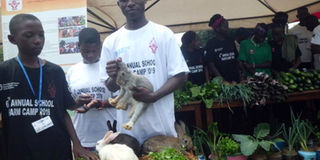In rabbits, I found a better place to grow my money

Hassan Amara explains how he keeps his rabbits. Photo by Lominda Afedraru
What you need to know:
- Hassan Amara plans to open a restaurant, the first one of its kind, in Kampala to sell rabbit nyama choma and fry samosas, sausages and hamburgers made from the meat, writes Lominda Afedraru
- The young farmer has entered into a business agreement with a rabbit meat processing company called Back and Door Rabbit Beef Company where he is required to supply between 20 to 30 rabbits per month.
It is now a common believe that the young people form a big part of the future farmers who are expected to represent the immense possibilities that the future holds in terms of capacity to impact lives and create safer and healthier spaces for them to engage in agriculture.
Hassan Amara, 15, a Senior Three student at Muyenga High school in Kampala is not an exception.
Amara attended the first school farm camp at Gayaza High School while in Senior One three years ago. He was so impressed with the farming initiatives by students from various school across the country and this inspired him to venture into rabbit keeping.
Amara is one of the students who was showcasing his farming initiative at the 6th school camp at Gayaza High School running for five days which was concluded on August 27, 2019. The farm camp attracted 112 schools with more than 800 students and 100 teachers participating in exhibiting what the young farmers are doing in terms of farming in their various schools and homes.
How he started
When Amara joined Senior One in 2017, he had no idea about farming. However at his school, the teachers engaged the students in various urban farming activities. He picked interest in rabbit keeping.
“I used to go to the school rabbit farm comprising of 350 rabbits. I got involved in feeding them with vegetables. When I went to our home in Kisugu, Kampala for my first holiday, I constructed a small cage and purchased four rabbits each at Shs42,000 which I started breeding. The initial capital I used was from my pocket money savings,” Amara narrated.
His rabbits have produced and multiplied to 250 now and he has expanded the cages to accommodate the number.
Since he attended the first school camp, he has never missed others because for him learning about the various farming initiatives is a continuous process.
Amara has managed to employ one person who takes care of his rabbits while he is at school pursuing his studies. He is able to pay him Shs70,000 per month as his mother supervises the farm.
Rabbit breeds
According to Amara it is important to keep hybrid and exotic rabbit breeds. The hybrids include New Zealand which are white, black and they have pinkish eyes and the chinchilla breed with long tails. The exotic breed is the California breed and both have a good feature of producing on monthly basis meaning the ability to multiply can be on the increase.
These breeds take three months to mature and they are resistant to diseases mainly influenza which is their major disease.
Benefits
Amara says his mother is the bread winner of the family and he has two siblings who are in Senior Six, one in Senior Four and one is in Primary Four.
He is helping his mother through the rabbit business to help clear some school dues for his two brothers who are in Senior Six. He is also depending on the rabbit business to clear his education bills.
Giant breed
They weigh up to nine kilogrammes. They attain sexual maturity late (nine months) and have less frequent and small litter sizes. They also have higher bone to meat ratio compared to other breeds. An example is the Flemish Giant.
Medium breeds
They weigh up to five kilogrammes with good management. They attain sexual maturity early (six months), are prolific breeders and best for meat production. Examples are California White and New Zealand White.
Small breeds
They weigh up to three kilogrammes with good management. They attain sexual maturity early and are very prolific breeders and hardy. Examples are Kenya White and Dutch breeds.
Challenges
Some of the challenges he grapples with are diseases such as coccidiosis and salmonellosis, but he has managed to stem them through good rabbit husbandry practices.
Amara says for a farmer to keep rabbits successfully, he must maintain high hygiene standards. “The cages must be well-ventilated and clean while water containers must be cleaned daily to protect the rabbits from diseases. We encourage farmers to keep a close eye on their rabbits, give them the correct diet, update vaccinations, regular health checks to keep diseases at bay.”
The animals need vaccines from week five to protect against myxomatosis and haemorrhagic disease, which cause intense suffering. A farmer should also watch out against bloat by giving the rabbits dry plants.
School farm camp
One of the development partners which has been at the forefront in ensuring the school farm camp is held annually for schools across the country is Food and Agriculture Organisation (FAO).
Dr Charles Owach the FAO assistant country representative notes that it is important to engage the young generation in agriculture initiatives through skilling.
Marketing and sales
The young farmer has entered into a business agreement with a rabbit meat processing company called Back and Door Rabbit Beef Company where he is required to supply between 20 to 30 rabbits per month.
He also sells the rabbits to the local communities and the selling price is determined by the weight of the rabbit.
Those that weigh between six and seven kilogrammes are sold at Shs80,000, the ones weighing between two and five kilogrammes are sold at Shs40,000 or Shs50,000 depending on the type of customers and those weighing one and two kilogrammes at Shs30,000.




